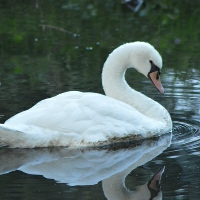古诗中的“炼字”艺术例说
古人写诗,十分讲究炼字,常是“吟安一个字,捻断数茎须”,“两句三年得,一吟双泪流”。下面就古诗的“炼字”艺术作一点简要介绍。
the ancients paid great attention to refining words when they wrote poems. they often said "chant an for one word, twist and break several stems and whiskers" and "two sentences for three years, one chant for two tears". here is a brief introduction to the art of "refining words" in ancient poems.
1、一字传情。用凝炼的文字表达丰富的意思。如“不知何处吹芦管,一夜征人尽望乡。”(李益《夜上受降城闻笛》)尽:都。着一“尽”字,写出了征人思乡的人数之多,伫立盼望的时间之长。
1. word for word. use condensed words to express rich meanings. if "i don't know where to blow the reed pipe, i'll visit my hometown overnight." (li yi, listening to the flute in the city at night) do: all. with a "do" word, wrote the number of homesickness, waiting for the long time.
2、以动衬静。如“明月松间照,清泉石上流。”(王维《山居秋暝》)前一句写诗人所见:朗照的秋月,在松林间仿佛过了滤似的,分外皎洁,投下了斑驳陆离的光影,境界显得更加宁静。后一句写诗人所闻:山泉格外清澈明净,它在山石上潺潺流淌,似乎还能听到它的叮咚的流水声。用清泉流淌反衬“空山”的清幽。
2. static with dynamic lining. such as "the bright moon and the pines shine, and the clear spring stone flows upward." (wang wei's autumn dusk in the mountain) the poet saw in the previous sentence: the bright autumn moon seems to pass through the filter in the pine forest. it is especially bright, casting mottled light and shadow, making the realm more peaceful. as the poet heard later, the mountain spring is very clear and clear. it flows on the rocks and seems to hear its tinkling sound. with the flow of spring against the "empty mountain" quiet.
3、化静为动。如“春风又绿江南岸,明月何时照我还。”(王安石《泊船瓜洲》)这个“绿”字写出了春风的气势、力量和作用,境界开阔,色彩鲜明,给人以春意盎然,生机勃勃的美感。
3. turn static into dynamic. such as "the spring breeze and the south bank of the green river, when will the bright moon shine on me?" (wang anshi's "berthing boat and guazhou") this "green" character describes the momentum, strength and function of spring wind, which has a broad realm, bright colors, and gives people a sense of spring and vitality.
4、以动写静。如“沙上并禽池上瞑,云破月来花弄影。”(张先《天仙子》)月本是相对静止的,但因为有了云的飘动,将“月”也写得动起来了。着一“破”字,写出明月冲破云层的动感。“花”本也是相对静止的,但着一“弄”字,便将它写得摇曳多姿起来。“弄”字意在点明:从云缝中探出头来的月亮,把月光洒在娇花上,像给娇花蒙上了一层轻柔的白纱,晚风轻轻地撩拨着含羞带娇的花。花在月光的映照下摆弄着娇羞柔美的倩影。“破”、“弄”两词,将云、月、花三种景物都人格化了,富有生命感。
4. write in motion. for example, "the sand and the pond are closed, and the clouds break the moon to make shadows." (zhang xian's "celestial fairy") the month was relatively static, but because of the floating clouds, the "month" can also be written. with the word "break", write the movement of the moon breaking through the clouds. "flower" is also relatively static, but with a "nong" word, it will be swaying up. the word "nong" is intended to make it clear: the moon protruding from the clouds sprinkles the moonlight on the delicate flowers, like a layer of soft white yarn covering the delicate flowers, and the evening breeze gently stirs up the flowers with shame and delicacy. flowers in the moonlight under the shadow of playing coquettish soft. the words "break" and "nong" personify the three landscapes of cloud, moon and flower, which are full of a sense of life.
5、以实显虚。以有形显无形。如“绿杨烟外晓寒轻,红杏枝头春意闹。”(宋祁《木兰花》)“春意”是只可感知,不可听闻的。春天来了,红色的杏花挤满枝头,诗人就在这幅春景图上着一“闹”字,用拟人手法,把它写活了。这一“闹”字既是绘景,又是写情,它不仅描绘了杏花盛开的艳丽景色,还写出了在春风吹拂下,杏枝摇曳,花儿微动的活泼神情。
5. to show emptiness with reality. visible and invisible. such as "green poplar smoke outside xiaohan light, apricot branches spring." (song qi's magnolia flower) "spring" can only be felt, not heard. spring is coming, red apricot flowers are full of branches. the poet wrote the word "nao" on this picture of spring scenery, using anthropomorphic technique to make it live. this word "nao" is not only a painting of scenery, but also a painting of sentiment. it not only describes the gorgeous scenery of apricot blossom, but also describes the lively look of the apricot branches swaying and the flowers moving in the spring breeze.
6、以乐衬哀。如“感时花溅泪,恨别鸟惊心。”(杜甫《春望》)鸟语花香,本是令人赏心悦目的景色,花鸟本是娱人之物,但因感时恨别,却使诗人见了反而泪落心惊。这样以乐景衬哀情,就使哀情更哀了。
6. set off sorrow with music. such as "when feeling splashed tears, hate other birds." (du fu's spring watch) the singing of birds and the fragrance of flowers are pleasant scenery. flowers and birds are entertaining things. however, the poet is shocked by the feeling of hate when he sees them. in this way, setting off the sadness with the music scenery makes the sadness more sad.
7、一语显旨。如“暖风熏得游人醉,直把杭州作汴洲。”(林升《题临安邸》)这两句表面上是说那些宴乐西湖流连光景的游人,陶醉于香风而逍遥自得。实际上这一“醉”字表明了那些忘怀故国的可耻嘴脸。这些人不但志气丧失,甚至连骨气也没有了。凝聚了作者的感慨和激愤。
7. one word shows purpose. for example, "the warm wind makes tourists drunk, making hangzhou bianzhou." (lin sheng's "the title of lin'an residence") on the surface, these two sentences say that those tourists who enjoy the scenery of the west lake enjoy the fragrance and enjoy themselves. in fact, the word "drunk" shows the shameful faces of those who forget their homeland. these people not only lose their ambition, but also their backbone. the author's emotion and indignation are condensed.
“炼字”的方法是多种多样的,目的是选择最恰当的字眼来表情达意,鉴赏时须根据诗意仔细琢磨体会,体会诗人的“炼字”艺术。
there are many ways to refine chinese characters. the purpose is to choose the most appropriate words to express the meaning. when appreciating, we must carefully ponder and experience the poet's art of refining chinese characters.
 幸福一家 2024-04-20 11:59:50
幸福一家 2024-04-20 11:59:50









